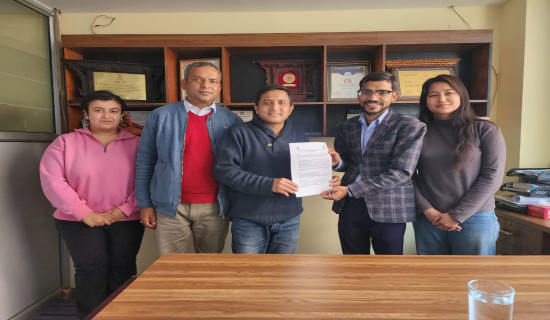- Friday, 20 February 2026
Civil Service Bill On The Anvil
The government has reintroduced the federal civil service bill in the parliament which was withdrawn from the federal legislature almost a year back due to controversies surrounding its several provisions. Some issues in the bill have become very ticklish and thorny which have rendered it difficult to thrash out and arrive at conclusive decision. The civil service act should have been enacted immediately after the election held in 2074 B.S in accordance with the federal constitution of Nepal. But this aspect had not been given enough attention by the succeeding governments as a result of which the implementation of administrative federalism has not gathered speed in the country.
The problematic issue that has remained very much undefined is what is generally known as increased blurring of demarcation of authority between politics and administration. Oftentimes bureaucrats poach into the territory of policy making which is the exclusive reserve of politicians whereas ministers and policy makers are also tempted to exercise undue influence on the jurisdiction of administrative authority. The relationship between politics and administration has been indeed a tricky one not only in Nepal but also in several democratic countries in the world.
Partisan orientation
The civil service bill that has been reintroduced in the parliament recently is also said to be flawed on several counts. As reported it has not clearly spelt out the role of civil servants' unions and association. There are worries that bureaucracy has been politicised due to their trade union type associations affiliated to different political parties which has reinforced their partisan orientation. Another major issue that has become a bone of contention is accountability relationship of the civil servants to three-tier governments – federal, State (Pradesh) and local.
Federalism has been implemented without a well thought out strategy in regard to effective administrative reorganisation in line with the constitutional and governing principles of the federal polity. Needless to say, Nepal has continued with the unified system of bureaucratic organisation with the central government keeping the hold and authority in recruiting, deploying, rewarding and punishing civil servants across the three tiers of the government.
Though centralised bureaucracy was instituted and practiced at the time when the country was run according to the unitary state system in the past, this should not be appropriate and suited to the federal structure of the state. Some policy makers still seem to be in favour of keeping central control over sub-national bureaucracy while many others had been opposed to it due to the fact that this tends to repeat and recommit, among others, the past centralised unitary practice. Today, state and local level key bureaucrats are recruited and administered from the Ministry of Federal Affairs and General Administration without any consultation with and concurrence of the state and local governments. This has infringed upon the self-rule principle of federalism. In fact, both state and local government should be practically enabled to exercise authority and autonomous space to set terms to hire and retrench the civil servants to work under their respective purview.
Civil servants are seemingly in favour of continuing their administrative loyalty and answerability to the central agencies which they perceive will safeguard their interests. The court ruling given not very long ago has also lent succor to this bureaucratic perspective as it has revoked the adjustment of some of the civil personnel at the sub-national level arguing that they were recruited for the federal level. The court ruling has been contested as it prejudices and goes against the spirit of federalisation and the administrative reorganisation of the state. As shared to this author by lawmakers of Provincial assemblies, the other day, Nepal's federalisation process has hit snags especially due to the issues related with the lack of proper administrative devolution and efficient personnel management. This has strained relations between state and federal government.
As the several functions that used to be planned and implemented at the central level have been constitutionally assigned to the provinces and local governments, sub national capacity to implement newly devolved functions needs to be enhanced. This capacity can be bolstered only if the adequacy of trained and competent personnel, among others, are provided under the purview of the sub national government. The top heavy bureaucratic structures has been kept at the federal level without being recast and restructured. The elite personnel embedded at the central bureaucracy have resisted in joining in to work under the purview of sub-national government.
Spirit of federalism
However, contrary to the spirit of the federalism, the bloated volume of the civil bureaucracy to the tune of forty five thousand is being retained with the federal government at the centre. Since the constitution limits the number of ministries and departments at the federal level, the size of bureaucracy will have to be thoroughly downsized through the fresh organisation and management survey according to the principles of subsidiarity.
Furthermore, Nepal’s bureaucracy has not been fully oriented to the well-known Max Weberian values characterised by legal-rational authority system that encompasses the fundamentals such as neutrality, state system loyalty, merit and competence, separation of public funds from private use and so on. Moreover, civil bureaucracy is swallowing a bigger chunk of the national revenue indicated by ever growing size of the recurring expenditure. Even then it has failed miserably to perform minimally according to expectations of the people. Unless bureaucratic set-up is reorganised and decentralised, subservient to the spirit of federalism, result oriented and citizen centric, the devolved political structural and functional arrangements at province and local level will make no sense for the ordinary populace of the country.
(The author is presently associated with Policy Research Institute (PRI) as a senior research fellow. rijalmukti@gmail.com)

















